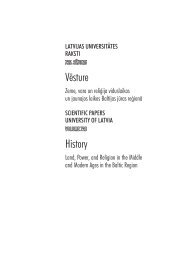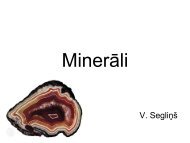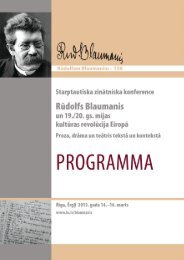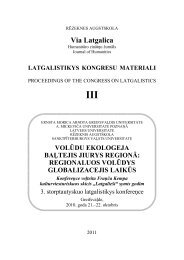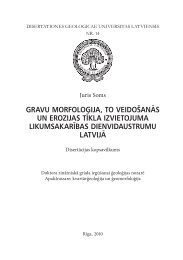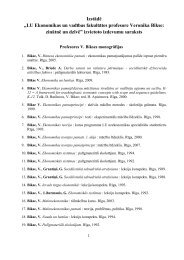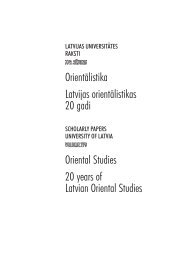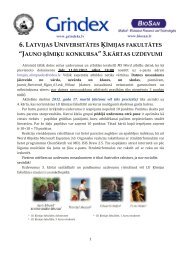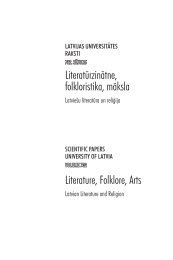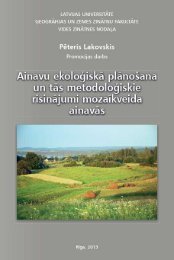Untitled
Untitled
Untitled
Create successful ePaper yourself
Turn your PDF publications into a flip-book with our unique Google optimized e-Paper software.
Alex Taube. Pârdomas par apgaismîbas laikmeta nozîmi postmodernajâ daiïliteratûrâ: Pîtera ..<br />
209<br />
finer Philosophie” 28 . When dissecting the woman’s corpse, Wren’s perceptions of<br />
the corpse evoke no images in his imagination, conjure up no memories or associations.<br />
His perceptions are wholly dissociated from his memory and imagination. In<br />
contrast, the perception of the body evokes an emotional response in Dyer and stimulates<br />
his imagination. It makes Dyer imagine the death of the woman and sympathise<br />
with her. While Wren is examining the corpse, Dyer relives the death of the woman in<br />
his imagination.<br />
Locke and other Enlightenment thinkers believed that human beings were rational<br />
and therefore equal, that they possessed the same natural rights of life, liberty and<br />
property, and that their behaviour was governed by the law of reason29 . To subvert<br />
this view Dyer talks about the world of the vagabonds and beggars, who are unreasonable,<br />
uneducated, unenlightened, and whose behaviour is irrational. They live in<br />
the darkness and are not aware of the passage of time. Society extols the virtues of<br />
liberalism and social progress and emphasizes the equality of all men, and yet the<br />
poor and the underprivileged are marginalized or excluded from it. London for Dyer<br />
is not a city full of light and merriment but rather a “Nest of Death and Contagion” 30 .<br />
The people tend to think that since London has been rebuilt its character has changed,<br />
but for Dyer London still is the “Capital City of the World of Affliction”, “the Capitol<br />
of Darknesse”, and “the Dungeon of Man’s Desires” 31 . He contrasts the vision of<br />
the privileged with that of the outcasts: “Those in their snug Bed–chambers may call<br />
the Fears of Night meer Bugbears, but their Minds have not pierced into the Horror<br />
of the World which others, who are adrift upon it, know” 32 . Society is to blame for<br />
the miserable condition of the poor and the outcast, and yet it severely punishes those<br />
whom it has consigned to a life of misery and deprivation: “most Men owe not only<br />
their Learning to their Plenty but likewise their Vertue and their Honesty. For how<br />
many Thousands are there in the World, in great Reputation for their Sober and Just<br />
dealings with Mankind, who if they were put to their Shifts would soon lose their<br />
Reputation and turn Rogues and Scoundrels? And yet we punish Poverty as if it were<br />
a Crime, and honour Wealth as if it were a Vertue. And so goes on the Circle of<br />
Things: Poverty begets Sin and Sin begets Punishment” 33 .<br />
Like most Enlightenment thinkers Sir Christopher Wren disregarded tradition and<br />
authority. “He liked to destroy Antient things: sad and wretched Stuff, he called it,<br />
and he us’d to say that Men are weary of the Reliques of Antiquity” 34 . Instead he<br />
praised “Sensible Knowledge” and “the Experimentall Learning” 35 , but Dyer was not<br />
convinced, and still doubted man’s ability to lay new foundations, having no better<br />
foundations to build upon than man’s nature. Dyer derived his knowledge of architecture<br />
from ancient authors. He is in favour of the ancients rather than the moderns:<br />
“We live off the past: it is in our Words and our Syllables. It is reverberant in our<br />
Streets and Courts, so that we can scarce walk across the Stones without being reminded<br />
of those who walked there before us” 36 . He studied “the antient Architects,<br />
for the greatness of the Antients is infinitely superior to the Moderns” 37 . Likewise,<br />
he believes that the truths expressed in art are eternal and that the ancient works of<br />
literature may be more truthful in their depiction of human nature, which, for Dyer, is<br />
changeless, thoroughly corrupt and impossible to perfect, than the works of contemporary<br />
writers. The Ancients’ “Tragedy reflects Corruption, and Men are the same<br />
now as they have ever been” 38 .



